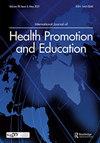Perceptions, experiences, expectations, and challenges of Indian public health programs
IF 0.7
Q3 EDUCATION, SCIENTIFIC DISCIPLINES
International Journal of Health Promotion and Education
Pub Date : 2022-07-08
DOI:10.1080/14635240.2022.2098161
引用次数: 1
Abstract
The COVID-19 pandemic has served as a wake-up call for India’s public health system. Public health if aided by strong political will, academic reforms, and awareness among youth (as a career choice)–will get a boost. Skilled public health professionals would be expected to play a key role in strengthening public health systems. Thus, to bring deep structural health reforms, it is imperative to analyse the perceptions of key public health stakeholders. In this study, we explored stakeholders’ perspectives about public health, and their views regarding the current state of public health education. Thirty-nine semi-structured in-depth interviews were conducted during 2017–2018 across India among stakeholders that included students of public health programs, public health professionals (PHPs), faculty of public health institutions, employers of public health graduates, and policymakers. Thematic analysis of the data was undertaken focusing on 10 themes emanating around the focus areas of the study. Public health stakeholders suggested that for building a competent public health workforce there is a need to match supply and demand of PHPs, create job opportunities, institutionalising a large body of guidance such as a separate Ministry or Council of public health (for educational institutions, quality assurance of curriculum etc.). Within India, the public health profession & education remains under-researched. This study is the first from a lower middle income country (LMIC) & from Asia to offer insight about public health programs–from policy, education, and professional perspective.印度公共卫生项目的认知、经验、期望和挑战
新冠肺炎大流行给印度公共卫生系统敲响了警钟。如果有强大的政治意愿、学术改革和年轻人的意识(作为职业选择)的帮助,公共卫生将得到提升。熟练的公共卫生专业人员有望在加强公共卫生系统方面发挥关键作用。因此,要进行深入的结构性卫生改革,就必须分析主要公共卫生利益攸关方的看法。在本研究中,我们探讨了利益相关者对公共卫生的看法,以及他们对公共卫生教育现状的看法。2017年至2018年,在印度各地对利益相关者进行了39次半结构化深度访谈,其中包括公共卫生项目的学生、公共卫生专业人员、公共卫生机构的教员、公共卫生毕业生的雇主和政策制定者。对数据进行了专题分析,重点是围绕研究重点领域提出的10个主题。公共卫生利益相关者建议,为了建立一支称职的公共卫生队伍,有必要匹配公共卫生专业人员的供需,创造就业机会,将一大批指导意见制度化,如单独的公共卫生部或委员会(针对教育机构、课程质量保证等),公共卫生专业和教育仍在研究之中。这项研究首次来自中低收入国家(LMIC)和亚洲,从政策、教育和专业角度深入了解公共卫生计划。
本文章由计算机程序翻译,如有差异,请以英文原文为准。
求助全文
约1分钟内获得全文
求助全文
来源期刊

International Journal of Health Promotion and Education
EDUCATION, SCIENTIFIC DISCIPLINES-
CiteScore
2.30
自引率
10.00%
发文量
69
 求助内容:
求助内容: 应助结果提醒方式:
应助结果提醒方式:


